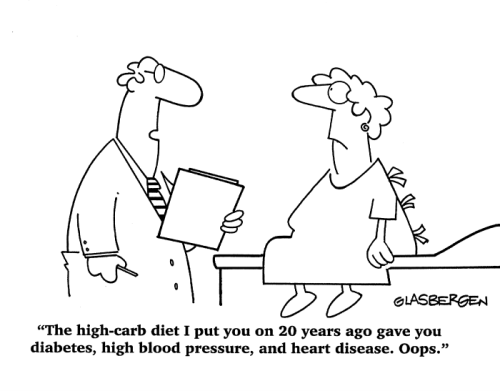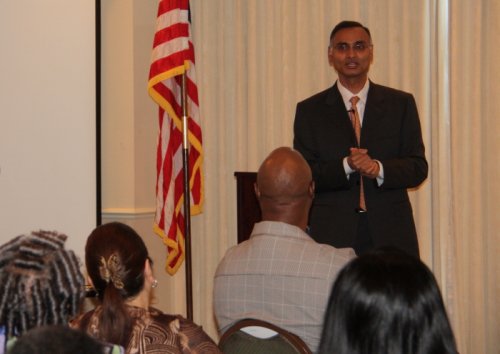-
Everything I Know About Diet I Did Not Learn in Medical School
How a Cardiologist Started a Diet Program: Physicians are not trained dietitians. Most medical students receive inadequate hours of nutrition education, and are not taught how food relates to cellular inflammation and chronic diseases. So when a doctor tells you to change your diet, he or she may not have the slightest idea of what exactly you need to change.
I am Dr. Kota Reddy , a cardiologist who has been in practice for the past 18 years. Back in medical school, we were taught to advise patients to change their diet and lifestyle in the treatment of diabetes and hypertension. We tell our patients to eat low-carb, low-fat, and low-salt diets; exercise; lose weight; and eliminate stress. That took me far, but I soon discovered that it did not take me far enough because when I started practicing, that vague advice did not help most of my patients. At the end of the day, patients would go home without a clue of what to eat and what to do, let alone have the understanding of why they needed to avoid certain foods.
We don’t explain what kind of diet our patients should follow, what foods are making them sick, or what lifestyle they should lead in order to get healthy because the truth is we ourselves don’t know. We just don’t have that particular skill set to point our patients in the right direction. We are trained mainly to medicate. We write script after script after script with much gusto. And when one pill doesn’t work, we either increase the dose or add another one, never realizing that diet is just as important or maybe more important than the drugs patients are taking.
In 2005, I began following the advice of the so-called ‘gurus’ in nutrition. I started an oatmeal diet and encouraged my patients to do the same. I ate oatmeal three times a day. During that time, it was perceived to be the best food to eat to lower cholesterol. After six weeks on the diet, I had gained weight and noticed that my blood sugar was slightly elevated. In addition, my triglycerides were high, my HDL (good cholesterol) was very low, and my LDL (bad cholesterol) was very high, with more than 60 percent of the LDL particles being small in size (which means higher risk for heart disease). That was the day I had to ask myself, “What is oatmeal?” Oatmeal is nothing more than a grain and full of starch like rice. If I have a fatty liver, eating starch will make it worse. It will make me gain more weight, increase my triglycerides, and make me at risk for diabetes and heart disease. If I already have diabetes, then eating starch will raise my blood sugar even higher.

That was my turning point in the way I practice medicine today. I started asking more questions about diet and looked for answers on my own. I even invested in a machine that measures changes in ‘endothelial function’ after eating a certain food. The endothelium is the innermost layer of cells found in all the blood vessels in the body and its function is easily affected by food. If the endothelium is unhealthy or dysfunctional, the rest of the body will be unhealthy. In fact, endothelial dysfunction is the earliest stage of chronic diseases, including heart disease.
My staff and I subjected ourselves to the following experiment. Every day we ate a specific type of food and measured its effect on the endothelium. After several months, we had tested hundreds of food items, and the results were unbelievable. It made me realize that most of the people in the field of nutrition had no clue what they are talking about. They were just quoting someone else’s opinion without checking it out. Even dietitians were giving advice without any knowledge of what they were saying. “Eat brown rice not white rice.” ”Eat fruits not sugar.” “Eat dark chocolate and drink alcohol in moderation.” “Do not eat eggs or red meat.” “Eat beans for fiber, blueberries for antioxidants, and bananas for potassium.” “Do not eat avocados because they contain a lot of cholesterol and fat.” “Fat will make you fat.” “You have diabetes because it runs in your family.” “You are gaining weight because you are consuming a lot of calories.” And so on and so forth…. All these statements are wrong.
After years of experimenting and searching for answers, I wrote a book entitled Eat This, Lose That! . It is an easy-to-understand guide explaining how the foods we eat affect us and what foods we should and should not eat to help reverse diabetes and heart disease and make us lose weight. I then went further and developed Reddy Bread. When patients eat this bread for breakfast, lunch, and dinner, their blood sugar and blood pressure drops, their cravings for sugar and starch disappear, and they lose weight faster even without exercise.
Finally, following the success of the book and the bread, I started a diet program that has helped so many people reverse their diabetes and heart disease, lose weight, and get off their medications. Now, you may ask, why is a cardiologist treating patients with diabetes? Well, for the past five years I noticed an increase in the number of patients in my practice who are either a diabetic or an undiagnosed diabetic. This is understandable, as diabetes and heart disease are part of a metabolic disease network that includes high blood sugar, high blood pressure, high cholesterol, and obesity. Simply put, people with diabetes will eventually have or may already have heart disease and other complications. So treating and preventing diabetes is as good as treating and preventing heart disease. More so, when I began to analyze the process of diabetes, I became more convinced that diet has the greatest impact in the development of both. Hence, the Eat This, Lose That Program was born.

Dr. Reddy at the Diabetes Conference
My program is unique; you will not find it anywhere else. It is a product of my years of research and experience from thousands of patients. If you want more information, please visit our websites www.reddycardiology.com and www.reddybread.com . I encourage you to learn everything about diet. Ask questions and find answers yourself. Stop following other people, myself included, without reviewing the facts. In my program, I will teach you the basics of diet and lifestyle so you will have the tools to think for yourself and decide which ones are good for you. My job is to teach you more than to treat you.
RECENT POSTS
-
One condition may be causing most of our medical problems including obesity and doctors may not know how to treat it
-
Two of the Common Things You Complain Every Day May Be a Sign of an Already Advanced Disease
-
Introducing FibroScan, A New Diagnostic Tool to Accurately Detect Fatty Liver Disease and Eliminate the Need for a Painful Liver Biopsy
